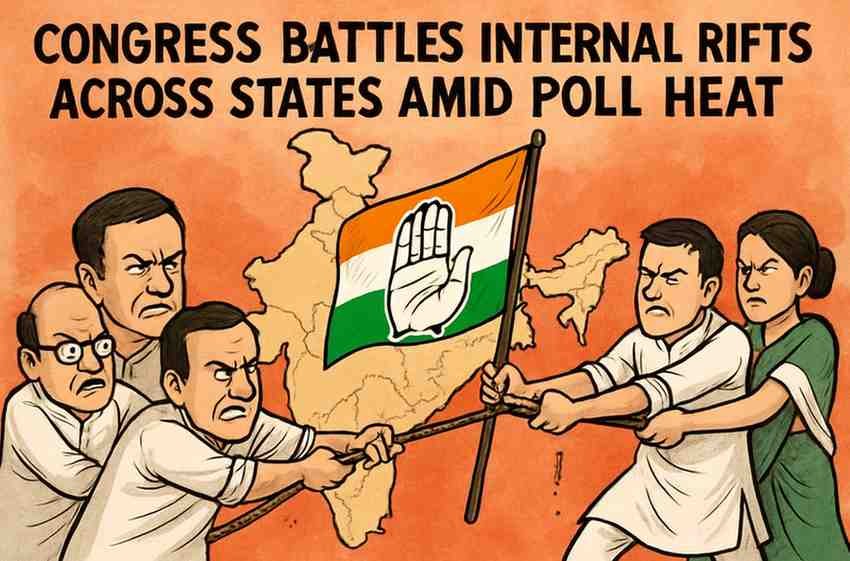
Leadership Paralysis at the Top
The Congress, India’s oldest political party, is once again facing turbulence at a crucial time. With Mallikarjun Kharge set to complete three years as All India Congress Committee (AICC) president, the party shows little sign of overcoming its chronic weaknesses. Instead of capitalising on the growing anti-incumbency against ruling parties across states, the Congress appears consumed by internal battles and lack of decisive leadership.
Senior leaders complain of “masterly inactivity” in Delhi, where efforts to revamp the Congress Working Committee (CWC) remain stalled. Younger leaders such as Rajani Patil, Harish Chaudhary, Girish Chodankar, and Ajay Kumar Lallu await inclusion in the CWC, but veterans like AK Antony and Ambika Soni continue to wield influence despite age and fading relevance. Efforts to move them aside have repeatedly faltered due to their long-standing proximity to Sonia Gandhi.
Trouble Brewing in Poll-Bound Bihar
Bihar, where assembly elections are due early next year, presents a complex challenge. Rahul Gandhi’s 1,300-kilometre “Vote Adhikar Yatra” drew large crowds and received attention from INDIA bloc allies like Tejashwi Yadav, MK Stalin, and Akhilesh Yadav. Yet, internal party assessments suggest the yatra may not translate into real votes. The campaign struck a chord on issues of voting rights but failed to provide a pragmatic strategy for booth-level mobilisation.
Adding to the confusion is the Congress’s refusal to endorse Tejashwi Yadav as the mahagathbandhan’s chief ministerial candidate. While RJD sees Tejashwi as the natural claimant, Congress strategists fear such an announcement might alienate key caste groups. The uncertainty risks alienating an already dominant ally and weakening the opposition bloc’s cohesion.
Assam and Kerala: Faces Without Consensus
Similar indecision looms in Assam and Kerala. In Assam, Gaurav Gogai is tipped as a rising leader, but factional divides prevent his clear projection as the Congress’s face. In Kerala, the leadership tussle is sharper. Poll surveys suggest Shashi Tharoor as the most popular Congress leader with nearly 28% support, far ahead of rivals like VD Satheeshan, Ramesh Chennithala, and KC Venugopal. Yet, internal resistance to Tharoor’s maverick style prevents the party from uniting behind him. This hesitancy reflects a recurring Congress problem—fear of grooming strong regional satraps who might overshadow central command.
Rajasthan, Madhya Pradesh and Haryana: Old Wounds Resurface
Rajasthan, where the Congress lost power in 2023, continues to reel under the rivalry between Ashok Gehlot and Sachin Pilot. The recent Delhi University Students’ Union elections, where the party’s youth wing NSUI fared poorly, further exposed divisions. While Pilot campaigned extensively, his detractors within the party shifted blame onto him instead of acknowledging organisational failures.
In Madhya Pradesh, Jitu Patwari and Umang Singhar face constant interference from veterans Kamal Nath and Digvijaya Singh, whose frequent spats play out publicly. Haryana tells a similar story, with Randeep Surjewala aspiring for state leadership but being stalled by entrenched factions. These power struggles keep the Congress distracted from presenting a united challenge to the Bharatiya Janata Party (BJP).
An Organisation in Decline
The Congress’s inability to resolve infighting comes at a steep price. Across states, the party’s grassroots network remains weak, unable to mobilise supporters beyond rallies and yatras. While Rahul Gandhi has sharpened his messaging and improved his public connect, the absence of organisational coherence means that charisma alone cannot deliver electoral victories.
Moreover, the central leadership’s reluctance to take bold calls—whether on removing ageing CWC members, declaring chief ministerial candidates, or enforcing discipline—has deepened the sense of drift. The party continues to oscillate between clinging to the past and experimenting cautiously with new faces, without committing to either path.
The Road Ahead
With assembly elections scheduled in Bihar, Assam, Kerala, and West Bengal next year, the Congress faces a defining moment. Allies within the INDIA bloc expect it to act decisively, but internal quarrels threaten to undercut its credibility. Unless Kharge and the Gandhis resolve leadership questions and energise the cadre, the Congress risks being overshadowed by regional allies even within the opposition fold.
As of now, the party appears locked in its familiar cycle—rhetoric without strategy, popular rallies without booth-level strength, and leaders more eager to undercut each other than challenge the ruling dispensation. For a party seeking revival, the cost of such inertia could be catastrophic.







